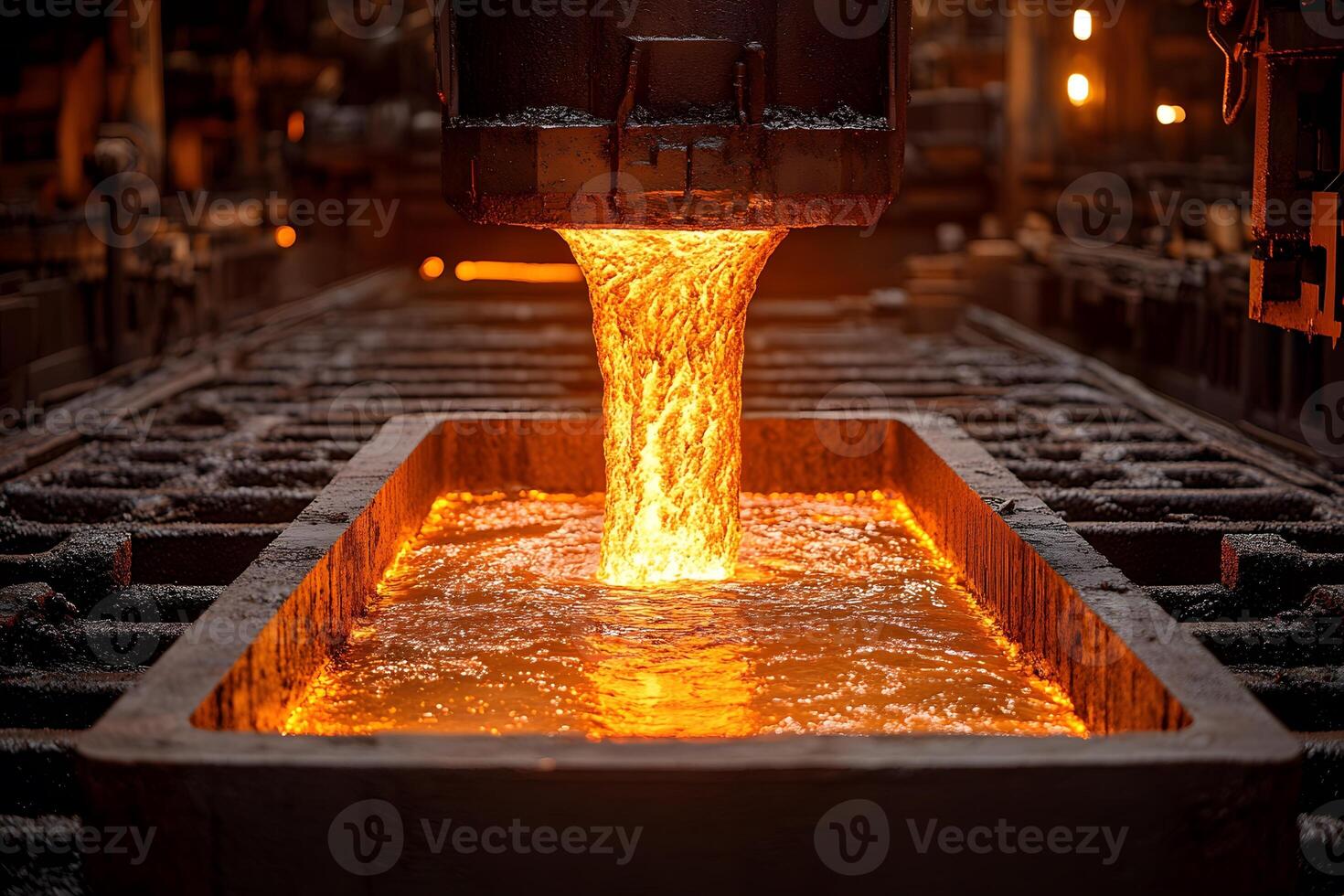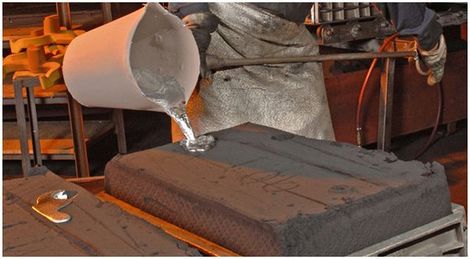How a Metal Foundry Combines Artistry and Precision
Wiki Article
A Comprehensive Overview to Metal Casting: Benefits and Providers Provided by Foundries
Metal casting is a vital process in different sectors, using numerous advantages through the solutions of foundries. These centers transform liquified metal right into long lasting and accurate parts, accommodating details client demands. By employing advanced modern technologies, foundries assure quality and effectiveness in manufacturing. The intricacies of metal casting and the diverse strategies entailed raise vital concerns concerning its duty in modern manufacturing. What technologies exist ahead in this essential field?Understanding the Metal Casting Process
The metal casting process is an essential method used in producing to produce complicated shapes and components. This technique involves pouring molten metal into a mold and mildew made to create the wanted things. The process begins with pattern creation, which functions as a design template for the mold and mildew. Metal Foundry. Different products, such as sand, metal, or ceramic, are utilized for mold-making, relying on the certain demands of the casting
When the mold is prepared, liquified metal is put into it and enabled to strengthen and cool. After solidification, the mold is removed, disclosing the actors part. Various strategies, including sand casting, investment casting, and pass away casting, are used, each suited to various applications and products. Quality assurance actions, such as evaluations and screening, are necessary to guarantee the end product meets requirements. Overall, the metal casting procedure plays a vital duty in producing components for industries ranging from automobile to aerospace.
Key Perks of Metal Casting
Metal casting offers substantial benefits that make it a preferred production approach in numerous markets. Its layout adaptability and precision permit detailed shapes, while cost-efficient mass manufacturing enhances effectiveness. Furthermore, the versatility and stamina of products used in casting add to the longevity of the end products.Layout Adaptability and Accuracy
Releasing remarkable design adaptability and accuracy, metal casting enables developers and engineers to create complex forms and features that would certainly be tough or impossible to attain with other producing approaches. This capability enables the production of intricate geometries, interior frameworks, and great information that boost item functionality and visual appeals. Furthermore, numerous casting strategies, such as sand casting, investment casting, and die casting, supply more options for personalization, fitting varied product homes and job needs. The flexibility of mold and mildews allows alterations throughout the layout stage, simplifying the shift from concept to end product. Ultimately, metal casting stands apart for its capability to provide high-precision elements, making it an invaluable procedure in sectors varying from automotive to aerospace and beyond.Affordable Mass Production
Affordable automation stands as one of the primary advantages of metal casting, enabling producers to generate large quantities of components at a lower expense each. This efficiency occurs from the capability to produce detailed mold and mildews that can be recycled numerous times, significantly minimizing configuration and functional expenses. Furthermore, metal casting procedures, such as sand casting and pass away casting, enable for high throughput, making it possible to meet the needs of massive production runs. The decreased product waste and power intake better boost price savings, making metal casting an appealing choice for industries needing mass elements. On the whole, the affordable nature of metal casting settings it as a recommended approach for suppliers intending for economic efficiency in their production processes.Product Convenience and Toughness
Among the standout characteristics of metal casting is its impressive product adaptability, which enables using a broad variety of metals and alloys. This adaptability allows manufacturers to pick materials that ideal suit their particular applications, from light weight aluminum and bronze to iron and steel. Each metal uses one-of-a-kind properties, including differing levels of stamina, corrosion resistance, and thermal conductivity. Subsequently, metal casting can produce parts that meet rigorous efficiency requirements across varied sectors, such as automobile, aerospace, and building. Additionally, the strength of cast steels can be enhanced via different treatment procedures, guaranteeing durability and longevity. Metal Foundry. In general, the combination of material adaptability and intrinsic toughness makes metal casting a recommended selection for generating top quality elementsKinds Of Metal Casting Methods
Metal casting includes a selection of strategies that deal with various production demands and product residential or commercial properties. Typical methods include sand casting, which utilizes a sand mold and mildew for intricate forms, and financial investment casting, understood for its precision and surface coating. Pass away casting is another technique that utilizes high-pressure injection of molten metal into mold and mildews, perfect for automation of little parts.Shell molding offers a much faster alternate, utilizing a resin-coated sand to create thin-walled mold and mildews, while shed foam casting enables elaborate designs without the demand for a core.
Furthermore, continuous casting is made use of for creating long areas of metal, such as sheets or bars, by solidifying molten metal in a continual procedure. Each technique is and provides unique benefits chosen based upon elements like the needed detail, manufacturing quantity, and material type, making certain premium results in metal manufacture throughout different industries.
The Duty of Foundries in Metal Casting
Shops play an essential role in the metal casting procedure, working as the centers where molten metal is changed right into finished items. These specialized facilities are equipped with the essential tools and modern technologies to manage various steels, guaranteeing top quality end results. Shops are accountable for several important functions, consisting of melting the metal, pouring it right into molds, and permitting it to solidify.Furthermore, they preserve rigorous security and ecological standards to secure employees and reduce eco-friendly influence. Competent professionals and engineers collaborate to enhance casting procedures, boosting efficiency and minimizing waste. Shops also engage in quality assurance procedures, making certain that the end products meet particular tolerances and requirements. This quality guarantee is essential for industries that depend on exact components, such as automobile and aerospace. As an outcome, shops add considerably to the general manufacturing landscape, allowing technology and development throughout various sectors.
Custom Metal Casting Services
Custom metal casting solutions supply customized style services that meet specific customer needs. These services also provide product option expertise, ensuring the appropriate metal is picked for official website the preferred application. Such flexibility and knowledge boost the general high quality and performance of the last item.
Customized Design Solutions
Tailored layout solutions in metal casting offer suppliers with the flexibility to produce parts that meet certain efficiency and visual requirements. Factories use customized services that enable customers to define dimensions, shapes, and surface area finishes to attain desired end results. This personalization procedure typically includes partnership in between developers and engineers, making sure that the end products line up with functional needs and sector standards. Advanced innovations, such as computer-aided design (CAD) and simulation software application, make it possible for precise modeling and testing of parts before production, lessening errors and improving performance. By leveraging tailored design services, companies can optimize performance while decreasing waste and expenses, eventually bring about a more one-upmanship in the marketplace. This flexibility is essential for industries requiring unique applications and specifications.Material Option Expertise
When selecting materials for metal casting, experience plays a vital role in ensuring that the appropriate option lines up with both performance needs and cost-effectiveness. Shops employ skilled specialists that understand the residential or commercial properties of various steels and alloys, enabling them to recommend excellent materials for specific applications. Variables such as stamina, deterioration resistance, and thermal conductivity are very carefully considered to fulfill the customer's needs. In addition, market trends and improvements in material scientific research notify these decisions, enabling foundries to remain affordable. By leveraging their knowledge, foundries can help customers in guiding via complicated product options, ultimately causing improved item high quality and lowered production prices. This specific expertise is important for achieving effective outcomes in personalized metal casting services.Quality Assurance in Metal Casting
Quality control in metal casting is essential to assure that the final items meet the called for specifications and efficiency standards. Shops employ a range of methodologies and methods to assure the best quality of actors parts. This process begins with rigid product inspections, verifying that basic materials conform with market requirements. Throughout the casting procedure, real-time surveillance and screening are performed to assess parameters such as temperature, mold integrity, and dimensional accuracy.
Applications of Metal Castings Across Industries
Metal castings play a critical role in numerous markets, serving as the foundation for many applications. In the automobile field, cast elements such as engine blocks and transmission housings are necessary for automobile performance and dependability. The aerospace industry relies upon accuracy castings for essential elements that assure safety and performance in flight. In addition, the click to investigate construction sector uses metal spreadings for fixtures, fittings, and architectural components, enhancing the longevity of buildings and framework.Furthermore, the energy field take advantage of spreadings used in wind turbine blades and other equipment important for power generation - Aluminum try these out Casting. The medical field also utilizes metal castings in instruments and gadgets, demonstrating the flexibility of this manufacturing process. Overall, metal castings are essential to the functionality and development of diverse sectors, showcasing their significance in modern technology and infrastructure development
Regularly Asked Inquiries
What Products Are Frequently Utilized in Metal Casting?
Common materials made use of in metal casting consist of light weight aluminum, iron, bronze, steel, and brass. Each product uses one-of-a-kind residential or commercial properties appropriate for different applications, enabling producers to choose the ideal alternative based upon deterioration, weight, and stamina resistance.How much time Does the Metal Casting Process Typically Take?
The metal casting procedure usually takes numerous hours to a couple of days, depending upon aspects such as the complexity of the design, sort of metal made use of, and the certain casting method employed by the shop.
What Is the Ecological Effect of Metal Casting?
The environmental effect of metal casting consists of energy consumption, exhausts, and waste generation. Shops typically apply steps to mitigate these results, such as recycling materials and making use of cleaner technologies to minimize their eco-friendly footprint.Can Metal Casting Be Done for Small-Scale Projects?
Metal casting can undoubtedly be executed for small-scale projects. Different shops deal with such needs, providing customized solutions that fit restricted manufacturing runs while keeping top quality and precision in the final products.What Are the Security Procedures in Metal Casting Foundries?
In metal casting shops, precaution include personal protective equipment, appropriate ventilation, training on devices use, emergency procedures, routine maintenance checks, and adherence to market security requirements to lessen threats connected with molten metal and dangerous materials.Additionally, metal casting processes, such as sand casting and pass away casting, allow for high throughput, making it possible to satisfy the needs of large-scale production runs. One of the standout attributes of metal casting is its remarkable material adaptability, which allows for the use of a large variety of steels and alloys. Additionally, constant casting is used for generating lengthy areas of metal, such as bars or sheets, by solidifying liquified metal in a continuous process. Factories play a pivotal role in the metal casting procedure, serving as the facilities where liquified metal is transformed into ended up items. Typical materials made use of in metal casting consist of aluminum, iron, steel, bronze, and brass.
Report this wiki page